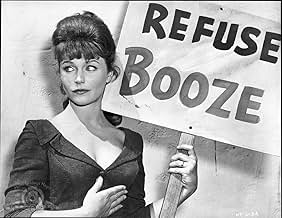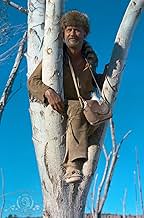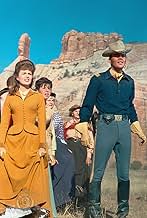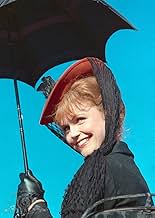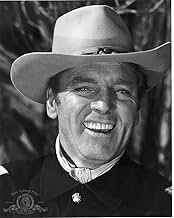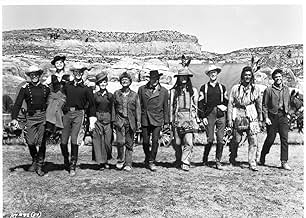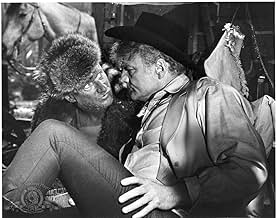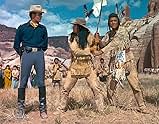NOTE IMDb
6,5/10
4,8 k
MA NOTE
En route vers Denver, une cargaison de whisky destinée aux mineurs est recherchée par la Temperance League, la cavalerie américaine, les Indiens locaux et les mineurs eux-mêmes.En route vers Denver, une cargaison de whisky destinée aux mineurs est recherchée par la Temperance League, la cavalerie américaine, les Indiens locaux et les mineurs eux-mêmes.En route vers Denver, une cargaison de whisky destinée aux mineurs est recherchée par la Temperance League, la cavalerie américaine, les Indiens locaux et les mineurs eux-mêmes.
- Réalisation
- Scénario
- Casting principal
- Récompenses
- 1 nomination au total
William 'Billy' Benedict
- Simpson - Miner
- (as Billy Benedict)
Hope Summers
- Mrs. Hasselrad
- (as Hope Sommers)
Avis à la une
I saw the movie when I was a very young man (20's) and absolutely loved its spirit. It was great to see seasoned actors playing their roles broadly and for laughs. It is very unusual to see Burt Lancaster blustering this much and Lee Remick is a perfect foil for him. A young Martin Landau has obvious fun in the role of the Indian guide. The gem of casting was Donald Pleasence as the hilarious visionary who "sees" the alcoholic wagon train as it crosses the plains, giving the movie its name.
The Hallelujah Trail is a spoof of the type of epic Western epitomized by such movies as Cimarron (1960) and How the West Was Won (1962).
The miners, headquartered in Denver, are threatened by thirst. The town's whiskey stocks, for what is expected to be a long, cold winter, are dangerously low. A wagon train of teamsters, led by Brian Keith, is hired to deliver more whiskey. The temperance ladies, led by Lee Remick, are trying to stop the whiskey. The Native Americans, a key figure among whom we will get to shortly, are trying to steal the whiskey. The cavalry, led by Burt Lancaster as assisted by Jim Hutton, is trying to maintain order. This leads to what is recorded, in the annals of the comedy West, as the Battle of...well, that would be giving too much plot away.
There are three memorable performances, all in supporting roles. One comes from the unseen narrator, who helps to chronicle events with his resonant voice and his, uh, uh, special...insight. Another comes from Martin Landau (Crimes and Misdemeanors, the TV series Mission Impossible). Landau plays Walks Stooped Over, a Native American who, from his role in peace negotiations, also goes by the name Symbol of Good Faith. Then we get to the sterling performance, which should have drawn an Oscar nomination. It comes from Donald Pleasance (James Garner's nearly blind POW buddy in The Great Escape). Pleasance plays Oracle, a visionary Denverite who is able to foresee the future, except that he first requires, uh, uh, lubrication.
I can think of only two other movies of approximately the same genre. At the head of the class, of course, is It's a Mad Mad Mad Mad World (1963). The other is the Japanese movie, Welcome Back, Mr. McDonald (1997). Okay, maybe three other movies. The extra one being Airplane! (1980). That should give you an idea.
The miners, headquartered in Denver, are threatened by thirst. The town's whiskey stocks, for what is expected to be a long, cold winter, are dangerously low. A wagon train of teamsters, led by Brian Keith, is hired to deliver more whiskey. The temperance ladies, led by Lee Remick, are trying to stop the whiskey. The Native Americans, a key figure among whom we will get to shortly, are trying to steal the whiskey. The cavalry, led by Burt Lancaster as assisted by Jim Hutton, is trying to maintain order. This leads to what is recorded, in the annals of the comedy West, as the Battle of...well, that would be giving too much plot away.
There are three memorable performances, all in supporting roles. One comes from the unseen narrator, who helps to chronicle events with his resonant voice and his, uh, uh, special...insight. Another comes from Martin Landau (Crimes and Misdemeanors, the TV series Mission Impossible). Landau plays Walks Stooped Over, a Native American who, from his role in peace negotiations, also goes by the name Symbol of Good Faith. Then we get to the sterling performance, which should have drawn an Oscar nomination. It comes from Donald Pleasance (James Garner's nearly blind POW buddy in The Great Escape). Pleasance plays Oracle, a visionary Denverite who is able to foresee the future, except that he first requires, uh, uh, lubrication.
I can think of only two other movies of approximately the same genre. At the head of the class, of course, is It's a Mad Mad Mad Mad World (1963). The other is the Japanese movie, Welcome Back, Mr. McDonald (1997). Okay, maybe three other movies. The extra one being Airplane! (1980). That should give you an idea.
This movie has always been a mystery to me. I loved it and chuckled to myself all the way through it, however, for some reason I have never been able to explain,it just does not work like it should.
Great cast from top to bottom, good charaterization and many good scenes and some others that just don't quite work. I love it anyway and watch my copy at least twice a year.
Great cast from top to bottom, good charaterization and many good scenes and some others that just don't quite work. I love it anyway and watch my copy at least twice a year.
It's sheer entertainment. I think (as an adult) judicious trimming would have made this film a real classic, but the performances and the very pointed outrageous humor are just really fun. I love the narration and the "maps" which don't really show anything, making fun of that old technique. I'm sure many audiences of today might not even get how this is kind of the Airplane of the sixties. My family actually went to see another movie with top billing at the drive in and we all loved this one much more. It's just plain fun. A bit too long, I agree, but well worth it for the giggles. It's quite star packed for the time as well, once again, reminding me of Airplane in later years. I'm not a western fan, but this is more than a western, it's really a spoof or satire, with no one taking themselves seriously and that gives it a great deal of fun quotient.
John Sturges created this film with tongue planted firmly in cheek. It's best enjoyed in its "letterbox' format, as it was shot in Ultra-Panavision, which at the time was being touted as the "new, improved" CINERAMA. Robert Surtees' photography is wide and wonderful and Elmer Bernstein's jaunty score highlights the film perfectly. Also, it's an opportunity to see four greats who have now passed on, Lancaster, Hutton, Remick, and Pleasance at the top of their craft.
Le saviez-vous
- AnecdotesStuntman Bill Williams was killed performing a stunt with a colleague during this shoot. The stunt called for Williams and another stuntman to guide a horse-drawn wagon toward a cliff. As the horses separated, both men were supposed to jump clear as the wagon continued over the cliff. Williams didn't manage to jump clear in time and died as a result of the fall.
- GaffesWhen Colonel Gearheart is seen drinking with Sergeant Buell at the end of the Temperance meeting, the oil lamp has an electric cord running from it.
- Citations
Col. Thaddeus Gearhart: Give a woman an acorn and the next thing you know, you're up to your rump in oak trees!
- Crédits fousThe opening titles and end title card are a set of illustrations of characters from the film.
- ConnexionsFeatured in Film Preview: Épisode #1.1 (1966)
- Bandes originalesHallelujah Trail
Written by Elmer Bernstein and Ernie Sheldon
Meilleurs choix
Connectez-vous pour évaluer et suivre la liste de favoris afin de recevoir des recommandations personnalisées
Détails
Box-office
- Budget
- 7 000 000 $US (estimé)
- Durée
- 2h 45min(165 min)
- Couleur
Contribuer à cette page
Suggérer une modification ou ajouter du contenu manquant


